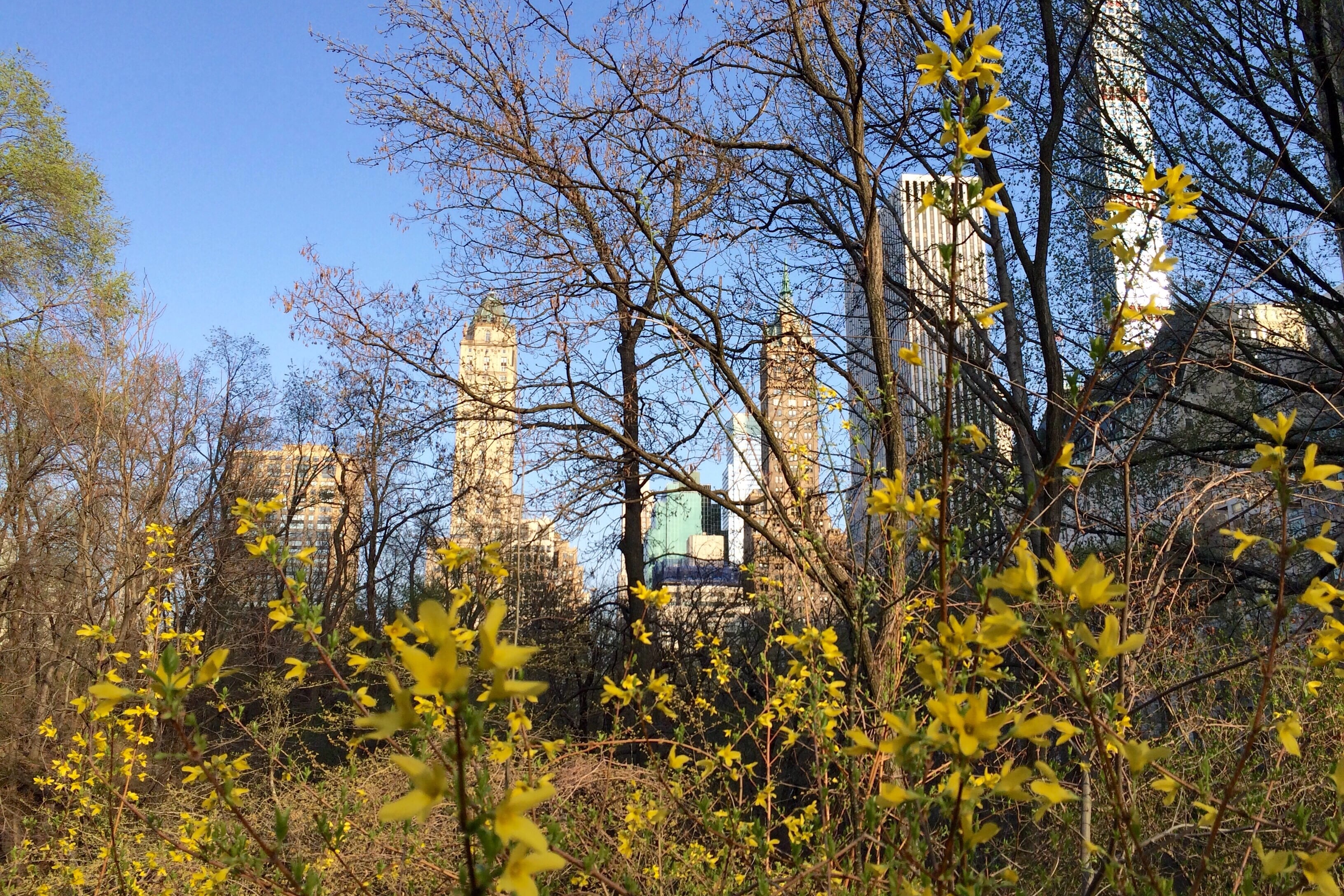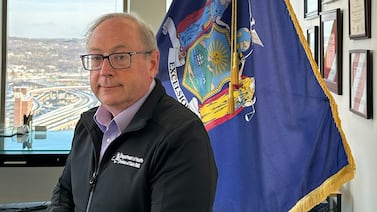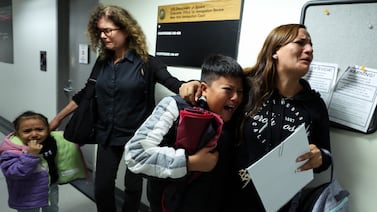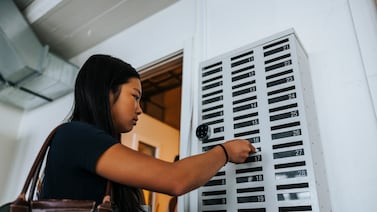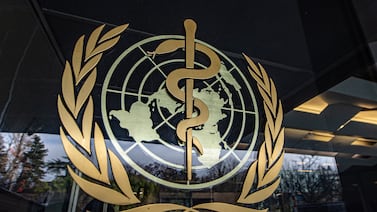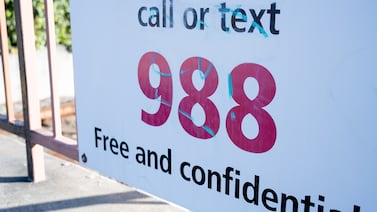This article originally appeared at Your Local Epidemiologist New York. Sign up for the YLE NY newsletter here. Public health, explained: Sign up to receive Healthbeat’s free New York City newsletter here.
Today’s Dose covers pollen allergies, 988 crisis line and AmeriCorps funding cuts, and New York City composting.
Peak pollen (and allergy) season is here in N.Y.
My itchy eyes and fatigue confirm the data: We’re at peak allergy season in New York.

Most U.S. locales see three pollen waves — trees, grass, weeds. New York is ending tree season and sliding into grass. Individual allergy sensitivity can vary by type of pollen. I’m a grass pollen girl myself. 💅🏻🌱
Over the past few decades, allergy seasons in New York have gotten worse, partly due to climate change. The average allergy season has grown by over three weeks since 1970, with higher pollen counts. Longer and more intense pollen seasons can exacerbate allergies and respiratory conditions for New Yorkers.
To reduce pollen exposure and prevent it from entering your home, there are a few things you can do:
- Check local pollen counts.
- Leave shoes at the door and change clothes after outdoor activities.
- Wipe off furry animals after they’ve been outside.
- Shower before bed.
- Keep windows closed during peak pollen times (midday).
- Run air conditioning or HEPA filters.
- Dust and vacuum regularly.
Dr. Zach Rubin, an allergy doctor, joined YLE on our podcast America Dissected last week and gave great tips on managing allergies:
- To relieve sinus symptoms, it can help to rinse your nose with saline water (like a neti pot), but only with distilled or sterilized water.
- For medications, second-generation antihistamines like cetirizine (Zyrtec) tend to have fewer side effects than diphenhydramine (Benadryl). Always talk with your doctor for more information.
Funding threats to the 988 crisis line
988 is a free, confidential call, text, or chat line that links people in mental or emotional distress to trained local counselors 24/7/365. Since its launch in 2022, the New York 988 Lifeline has responded to more than 778,000 calls and about 139,000 texts. Counselors provide help for mental health struggles, emotional distress, alcohol or drug use concerns, or just someone to talk to. It’s funded by federal, state, and local dollars. However, funding for this critical safety net is being actively debated in New York City.
There are two looming funding threats:
- City cuts: New York City cut ~$12 million from the nonprofit that answers local 988 calls, Vibrant Emotional Health. Without additional support, Vibrant has signaled that it could lay off up to a third of its staff in the coming months.
- Federal cuts: A draft federal budget suggests cutting funding for specialized 988 services that support LGBTQ+ youth, a group at heightened risk for suicide. Some 988 counselors are trained to serve these populations and often have similar life experiences. Since 2022, 988 has responded to nearly 1.3 million calls, texts, or online chats nationally from LGBTQ+ people.
Why it matters
No changes have been made yet. 988 will remain a resource and continue supporting and linking those in crisis with trained counselors. There is also a line that LGBTQ+ youth can continue to reach out to outside of 988: the Trevor Project’s helpline.
But if the layoffs in New York go through, callers may wait longer, more may hang up before help arrives, and fewer counselors will be available, especially those trained to support high‑risk groups like LGBTQ+ youth.
AmeriCorps funding cuts
AmeriCorps is a national service program that provides participants with living allowances to serve community needs, mainly in education and public health — kind of like the Peace Corps for our communities. Last week, the federal government abruptly cancelled $400 million in funding for AmeriCorps, roughly 40% of its total funding. New York was hit hard: $30 million was cut from New York programs, leaving 1,200 AmeriCorps workers in New York without income and benefits, and halting programs providing critical resources for New Yorkers. In response, New York Attorney General Letitia James joined 24 other states in suing the federal government to stop the dismantling of AmeriCorps.
Why it matters
AmeriCorps supports more than 24,000 volunteers and members statewide who have provided critical services in vulnerable communities for decades.
The New York programs abruptly cut last week provided:
- Community health education
- Peer mental health services
- Food for unhoused New Yorkers
- Disaster preparedness training
AmeriCorps supports many upstream public health needs: nutritious meals that keep chronic diseases in check, tutors who help kids read on grade level (a predictor of lifelong health), and counselors who connect families to benefits before crises snowball. With these cuts, coverage will become even more patchy — some neighborhoods will keep services, while others may lose them entirely. The program also provides young Americans with an experience of serving their communities where their skills are needed most.
What you can do
The litigation may help restore these funds, but if it doesn’t, community organizations will need to fill the gaps. What can help right now is spreading the word, contacting governmental representatives, and if you’re able, donating to or volunteering with affected organizations — they are scrambling for resources.
Composting is so in right now
In a city of 8 million people, how we handle our garbage is a frontline public health service. When garbage and food scraps sit out, they attract rats, roaches, and the pathogens those pests carry. That’s why, every day, the NYC Department of Sanitation carts away roughly 24 million pounds of trash, recycling, and compostables. The city is making it a lot easier for residents to compost our food waste.
There are good reasons to compost:
- To prevent food scraps from releasing methane into the atmosphere as they break down, contributing to climate change.
- Separating food scraps from other garbage helps fight the city’s rat infestation by removing their food source.
- Repurpose food scraps into compost soil that can be used in city green spaces. Residents and non-profits can get free compost soil from compost give-back sites in Queens, Brooklyn, and Staten Island, as well as pop-up sites across the city.
Compost is now picked up weekly on your recycling day — find your collection schedule here.
Starting last month, owners of buildings with four or more units must provide bins for food waste or face fines.
Another option is to use the city’s “Smart Composting Bins,” which can be opened with a QR code. I use this option — we store compost in the freezer to keep it from smelling or attracting bugs, then drop it off in a Smart Bin down the street.
Bottom line
You’re all caught up on New York public health news! See you next week :)
Love,
Your NY Epi
Dr. Marisa Donnelly, PhD, is an epidemiologist, science communicator, and public health advocate. She specializes in infectious diseases, outbreak response, and emerging health threats. She has led multiple outbreak investigations at the California Department of Public Health and served as an Epidemic Intelligence Service Officer at the Centers for Disease Control and Prevention. Donnelly is also an epidemiologist at Biobot Analytics, where she works at the forefront of wastewater-based disease surveillance.

